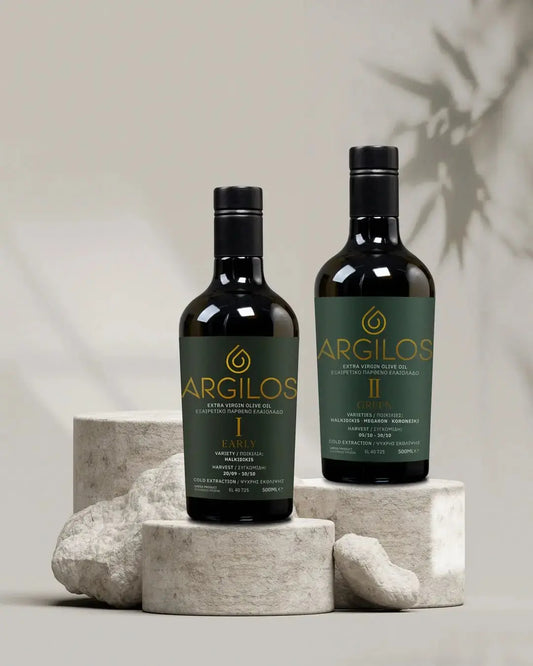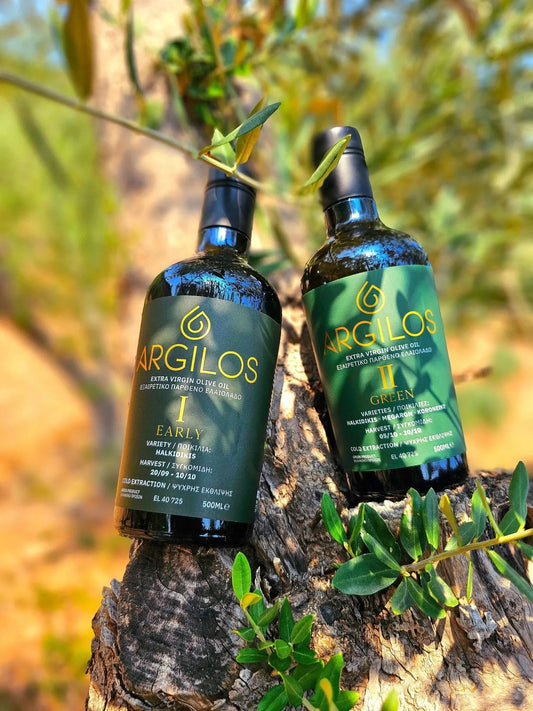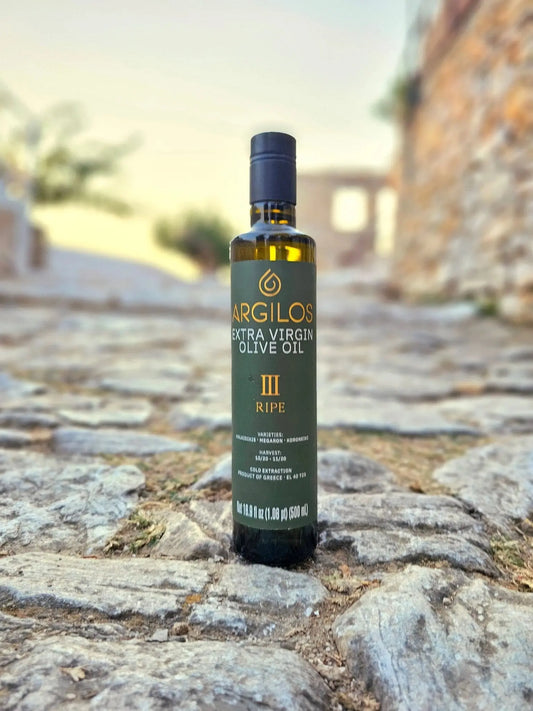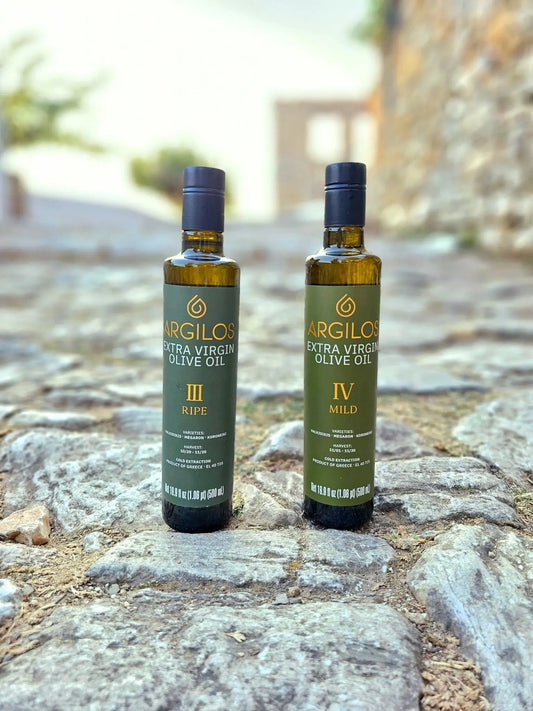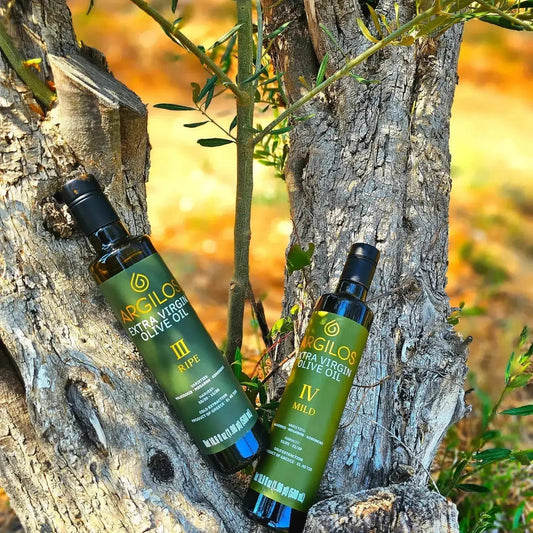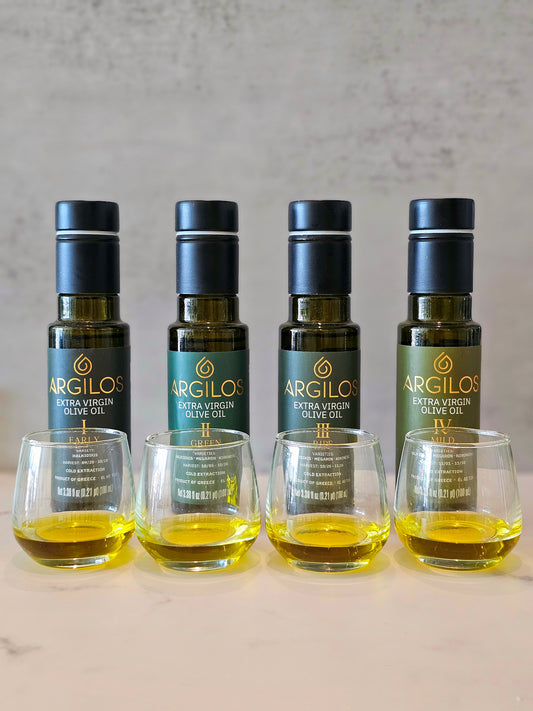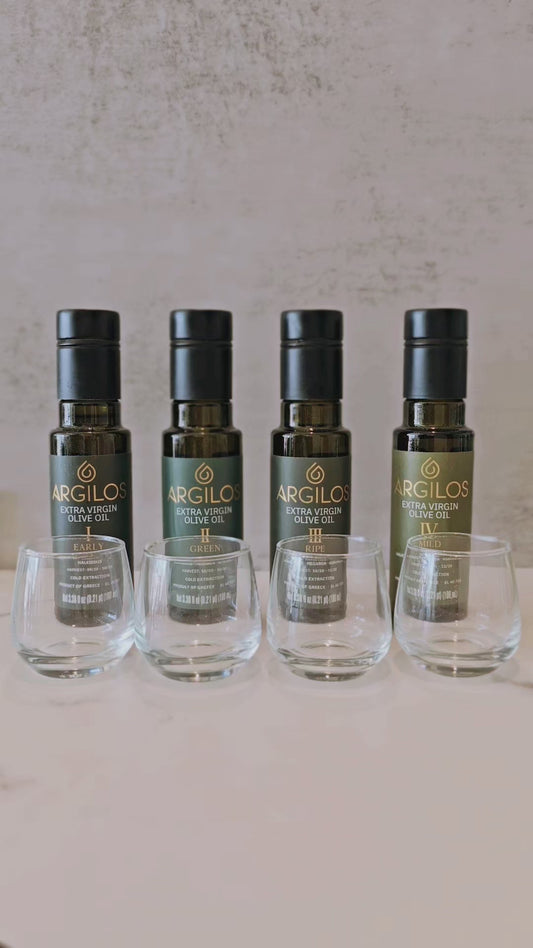How Much Olive Oil Should I Drink: A Guide to Daily Consumption
Share
Key Takeaway: Health experts recommend 1-2 tablespoons (15-30ml) of extra virgin olive oil daily, with 1 tablespoon being optimal. Morning or evening consumption both offer benefits depending on your goals and digestive comfort.
______________________________________________
The question of “how much olive oil should I drink” has gained significant attention in culinary and wellness circles, particularly among professionals who understand the value of high-quality extra virgin olive oil in both flavor development and health maintenance.
The practice of drinking olive oil has deep Mediterranean roots, where generations of families have incorporated this liquid gold into their daily routines. For chefs and culinary enthusiasts, understanding the proper dosage becomes even more critical, as you're likely exposed to various olive oil qualities throughout your professional work and want to maximize the benefits in your personal health regimen.
How Much Olive Oil Should I Drink Daily for Optimal Health
When determining how much olive oil should I drink a day, nutritionists and Mediterranean diet experts consistently recommend 1-2 tablespoons (15-30 milliliters) as the optimal daily intake. This amount provides substantial health benefits without overwhelming your digestive system or contributing excessive calories to your daily intake.
The recommended dosage breaks down as follows:
-
Beginners should start with 1 teaspoon (5ml) daily and gradually increase to 1 tablespoon (15ml) over the course of two weeks.
-
Experienced users who have built tolerance can consume up to 2 tablespoons (30ml) daily, though this should be the maximum for most individuals.
For culinary professionals who already consume olive oil through cooking and tasting, it's essential to account for your total daily olive oil intake. If you regularly taste dishes containing olive oil or cook with significant amounts, you may want to reduce your direct consumption accordingly to maintain the recommended total daily intake.

Research from Mediterranean populations suggests that consistent daily consumption within this range correlates with improved cardiovascular health, better nutrient absorption, and enhanced cognitive function. The key lies in consistency rather than large occasional doses, which can cause digestive discomfort and may not provide the same cumulative health benefits.
Quality matters significantly when drinking olive oil directly. Premium extra virgin olive oils offer superior flavor profiles and higher concentrations of beneficial compounds like polyphenols and antioxidants, making them ideal choices for direct consumption.
Morning vs Evening: When to Drink Olive Oil
The timing of olive oil consumption can significantly impact its effectiveness and your body's response. Understanding how much olive oil should I drink in the morning versus how much olive oil should I drink before bed requires consideration of your specific health goals and daily routine.
Morning Consumption Benefits: Drinking olive oil first thing in the morning, particularly on an empty stomach, maximizes absorption of fat-soluble vitamins and beneficial compounds. Many chefs prefer morning consumption because it provides sustained energy throughout busy kitchen shifts and helps maintain stable blood sugar levels during long cooking periods.
The recommended morning dose ranges from 1-2 teaspoons (5-10ml) taken 30 minutes before breakfast. This timing allows the olive oil to coat the digestive tract gently and prime your system for nutrient absorption throughout the day. For culinary professionals who start early shifts, this practice can provide steady energy without the crashes associated with caffeine or sugar-based energy sources.
Evening Consumption Considerations: How much olive oil should I drink before bed depends largely on your digestive sensitivity and sleep patterns. Evening consumption, typically 1 teaspoon to 1 tablespoon (5-15ml) taken 2-3 hours before bedtime, can support overnight cellular repair and provide anti-inflammatory benefits during sleep.
Some chefs prefer evening consumption after particularly demanding kitchen shifts, as the anti-inflammatory properties may help with muscle recovery and stress reduction. However, consuming olive oil too close to bedtime may cause digestive discomfort for sensitive individuals, so timing is crucial.
Our previous post suggests that splitting your daily olive oil intake between morning and evening—half a tablespoon twice daily—may provide optimal benefits by maintaining consistent levels of beneficial compounds in your system throughout the day.
Health Benefits of Drinking Olive Oil
The health benefits of olive oil consumption extend far beyond its culinary applications, making it particularly valuable for chefs who want to maintain optimal health despite the physical demands of kitchen work.
Cardiovascular Health: Regular olive oil consumption supports heart health through its high concentration of monounsaturated fats, particularly oleic acid. These healthy fats help reduce LDL (bad) cholesterol while maintaining or increasing HDL (good) cholesterol levels. For chefs working in high-stress environments, this cardiovascular support becomes especially important for long-term health maintenance.
Anti-Inflammatory Properties: Extra virgin olive oil contains powerful anti-inflammatory compounds, including oleocanthal, which exhibits similar effects to ibuprofen but without the side effects. This natural anti-inflammatory action can help chefs manage the physical stress of long hours on their feet and repetitive motions common in professional kitchens.
Digestive Health: Direct olive oil consumption can improve digestive function by stimulating bile production and enhancing the absorption of fat-soluble vitamins (A, D, E, and K). This benefit is particularly relevant for culinary professionals who need optimal nutrient absorption to maintain energy levels during demanding shifts.
Brain Health and Cognitive Function: The polyphenols in high-quality olive oil cross the blood-brain barrier and provide neuroprotective benefits. For chefs who rely on sharp mental acuity for recipe development, multitasking, and creative problem-solving, these cognitive benefits can enhance professional performance.
Skin and Hair Health: The vitamin E and antioxidants in olive oil support skin elasticity and hair strength from the inside out. Kitchen environments can be harsh on skin and hair due to heat and chemicals, making internal olive oil consumption a natural way to counteract these effects.
How to Properly Consume Olive Oil
The method of consuming olive oil directly affects its palatability and effectiveness. As a chef, you understand that technique matters in every aspect of culinary practice, and drinking olive oil is no exception.
Straight Consumption: The most direct method involves consuming olive oil straight from a spoon. Choose high-quality extra virgin olive oil with a flavor profile you enjoy, as lower-quality oils may be harsh or unpleasant when consumed directly. Take the oil slowly, allowing it to coat your mouth before swallowing, which can help reduce any burning sensation from peppery varieties.

Mixed with Lemon Juice: Combining olive oil with lemon juice creates a more palatable mixture while adding vitamin C and citric acid benefits. Mix 1 tablespoon of olive oil with 1 teaspoon of fresh lemon juice for a traditional Mediterranean health tonic.
With Warm Water: Some practitioners prefer mixing olive oil with warm (not hot) water to create an emulsion that's easier to digest. This method can be particularly helpful for those who find straight olive oil too intense.
Temperature Considerations: Never heat olive oil before drinking it, as high temperatures can destroy beneficial compounds and create harmful oxidation products. Room temperature or slightly cool olive oil preserves maximum nutritional value.
Quality Selection: Choose cold-pressed, extra virgin olive oils from reputable producers. Argilos varieties offer different intensity levels, allowing you to select based on your taste preferences and tolerance levels.
Potential Risks and Considerations
While olive oil consumption offers numerous benefits, understanding potential risks ensures safe and effective practice. As culinary professionals, maintaining awareness of these considerations helps you make informed decisions about incorporating olive oil into your health routine.
Caloric Content: One tablespoon of olive oil contains approximately 120 calories, primarily from fat. While these are healthy fats, they still contribute to your daily caloric intake. Chefs who already consume olive oil through cooking should account for total daily intake to avoid unintentional weight gain.
Digestive Sensitivity: Some individuals may experience digestive discomfort, including nausea, diarrhea, or stomach upset, especially when first beginning olive oil consumption or when consuming large amounts. Starting with smaller doses and gradually increasing allows your digestive system to adapt.
Medication Interactions: Olive oil can potentially interact with certain medications, particularly blood thinners and diabetes medications. The healthy fats in olive oil may enhance the absorption of fat-soluble medications, potentially altering their effectiveness. Consult healthcare providers if you take prescription medications regularly.
Gallbladder Concerns: Individuals with gallbladder disease should exercise caution with direct olive oil consumption, as the fat content may trigger gallbladder contractions and potentially worsen symptoms.
Quality Variations: Not all olive oils are suitable for direct consumption. Avoid refined, light, or low-quality olive oils that may contain harmful compounds or lack beneficial nutrients. Stick to certified extra virgin varieties from trusted producers.
Allergic Reactions: While rare, some individuals may have sensitivities to olive oil, particularly those with existing tree nut or pollen allergies. Discontinue use if you experience any allergic symptoms.
Choosing the Right Olive Oil for Drinking
Selecting appropriate olive oil for direct consumption requires different criteria than choosing cooking oils. Your expertise as a chef provides valuable insight into quality assessment, but drinking olive oil demands specific characteristics that enhance both safety and effectiveness.
Acidity Levels: Look for extra virgin olive oils with acidity levels below 0.3%, as lower acidity indicates superior quality and reduced harshness when consumed directly. High-quality oils typically meet these stringent standards.
Freshness Indicators: Choose oils with recent harvest dates and consume within 18-24 months of production. Fresh olive oil retains maximum beneficial compounds and offers better flavor when consumed straight.
Flavor Profiles for Drinking: While you might prefer robust, peppery oils for cooking, milder varieties often work better for direct consumption, especially for beginners. Mild intensity options provide health benefits without overwhelming intensity.

Processing Methods: Ensure oils are cold-pressed and unfiltered when possible, as these methods preserve maximum nutrients and beneficial compounds essential for health benefits.
Storage and Handling: Purchase olive oil in dark glass bottles or tins that protect from light exposure. Store in cool, dark places away from heat sources to maintain quality and prevent rancidity.
Certification and Testing: Look for oils with third-party testing certifications that verify purity, authenticity, and nutritional content. Reputable producers provide detailed information about their testing procedures and results.
Conclusion
The question of how much olive oil should I drink ultimately depends on individual tolerance, health goals, and lifestyle factors. For most culinary professionals and olive oil enthusiasts, 1-2 tablespoons daily, consumed consistently and with attention to quality, provides optimal health benefits while respecting the body's digestive capacity.
Remember that drinking olive oil should complement, not replace, a balanced diet rich in Mediterranean principles. As chefs, you understand the importance of quality ingredients and proper technique—apply these same principles to your personal health practices. Start slowly, choose high-quality oils, and listen to your body's responses to develop a sustainable routine that supports your culinary career and overall well-being.
Whether you choose morning consumption for sustained energy, evening intake for recovery benefits, or a split routine for consistent absorption, the key lies in maintaining regularity and using premium extra virgin olive oil that reflects the same standards you demand in your professional kitchen.
Frequently Asked Questions
Can I drink olive oil every day?
Yes, drinking 1-2 tablespoons of extra virgin olive oil daily is safe and beneficial for most people. Start with smaller amounts and gradually increase to allow your digestive system to adapt.
Will drinking olive oil help me lose weight?
While olive oil contains healthy fats that can support metabolism and satiety, it's also calorie-dense at 120 calories per tablespoon. Weight loss depends on overall caloric intake and expenditure.
What happens if I drink too much olive oil?
Consuming excessive amounts can cause digestive issues like nausea, diarrhea, and stomach discomfort. Stick to the recommended 1-2 tablespoons daily maximum.
Is it better to drink olive oil with food or on an empty stomach?
Both methods have benefits. Empty stomach consumption maximizes absorption, while taking it with food may be gentler on sensitive digestive systems.
Can I drink regular olive oil instead of extra virgin? Extra virgin olive oil is recommended for drinking as it contains higher levels of beneficial compounds and antioxidants compared to refined olive oils.
How long does it take to see health benefits?
Some people notice digestive improvements within days, while cardiovascular and anti-inflammatory benefits typically develop over weeks to months of consistent consumption.
Should I refrigerate olive oil for drinking?
No, refrigeration can cause olive oil to solidify and may affect its flavor. Store in a cool, dark place at room temperature.
Can drinking olive oil replace taking supplements?
While olive oil provides many nutrients, it shouldn't replace a balanced diet or essential supplements recommended by healthcare providers.
References:
-
Bes-Rastrollo M, Sánchez-Villegas A, de la Fuente C, de Irala J, Martinez JA, Martínez-González MA. Olive oil consumption and weight change: the SUN prospective cohort study. Lipids. 2006 Mar;41(3):249-56. doi: 10.1007/s11745-006-5094-6. PMID: 16711599.
-
Benítez-Arciniega AD, Gómez-Ulloa D, Vila A, Giralt L, Colprim D, Rovira Martori MA, Schröder H. Olive oil consumption, BMI, and risk of obesity in Spanish adults. Obes Facts. 2012;5(1):52-9. doi: 10.1159/000336848. Epub 2012 Mar 2. PMID: 22433617.
-
Soriguer F, Almaraz MC, García-Almeida JM, Cardona I, Linares F, Morcillo S, García-Escobar E, Dobarganes MC, Olveira G, Hernando V, Valdes S, Ruiz-de-Adana MS, Esteva I, Rojo-Martínez G. Intake and home use of olive oil or mixed oils in relation to healthy lifestyles in a Mediterranean population. Findings from the prospective Pizarra study. Br J Nutr. 2010 Jan;103(1):114-22. doi: 10.1017/S0007114509991498. Epub 2009 Sep 14. PMID: 19747416.

